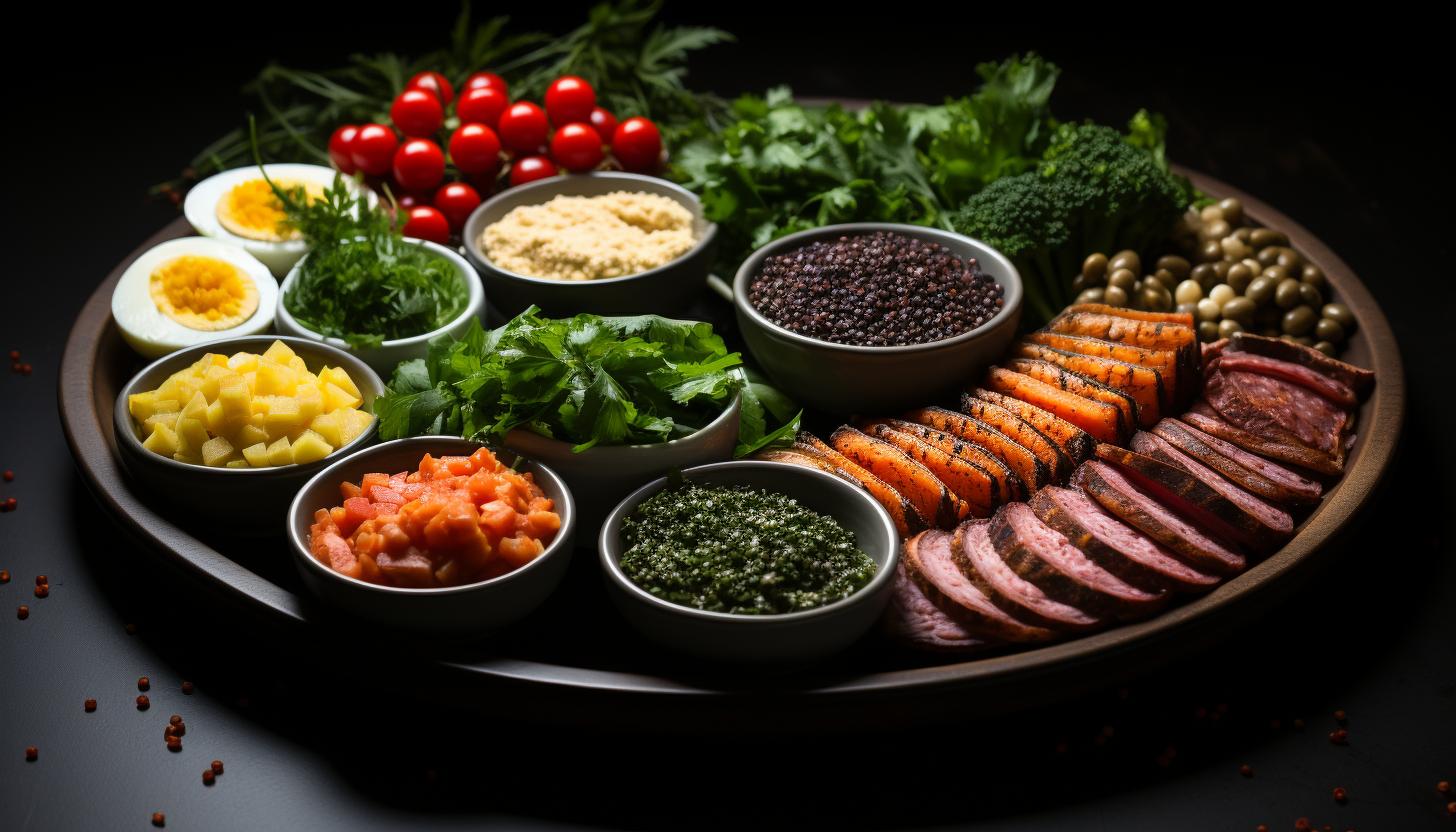Debunking the Protein Myth: How Much Do Runners Really Need

Are you tired of hearing conflicting advice about how much protein you really need as a runner? Look no further – this article is here to debunk the protein myth once and for all.
We’ll dive into the importance of protein for runners, break down the science behind optimal performance, and address common misconceptions.
Plus, we’ll explore the factors that influence your unique protein needs and provide practical tips to help you meet them.
So lace up your running shoes and get ready to discover the truth about protein!
The Importance of Protein for Runners

You might be wondering, how much protein do you really need as a runner?
Protein is an essential nutrient for runners as it plays a vital role in muscle repair and recovery. It helps to rebuild damaged muscle fibers after intense workouts and aids in the growth and maintenance of lean muscle mass.
The recommended daily intake of protein for runners is around 1.2 to 2 grams per kilogram of body weight, depending on the individual’s training intensity and goals.
To meet your protein needs, it is important to include a variety of protein sources in your diet. Good sources of protein for runners include lean meats like chicken, turkey, and fish; dairy products such as milk, yogurt, and cheese; legumes like beans and lentils; eggs; and plant-based proteins like tofu, tempeh, quinoa, and chia seeds.
Protein timing also plays a crucial role in optimizing muscle recovery. Consuming protein within 30 minutes to an hour after exercise can help enhance muscle repair and synthesis. This can be achieved by having a post-workout snack or meal that contains both carbohydrates and proteins.
Understanding Protein Requirements for Optimal Performance

Understanding the protein requirements for optimal performance is crucial for runners. To help you navigate this topic effectively, consider the following:
– Protein Timing
– Consuming protein before and after your runs can enhance muscle repair and growth.
– Aim to have a protein-rich meal or snack within one hour of completing your run.
– Protein Sources
– Incorporate a variety of high-quality protein sources into your diet, such as lean meats, poultry, fish, eggs, dairy products, legumes, nuts, and seeds.
– Plant-based proteins like tofu and quinoa are excellent options for vegetarian or vegan runners.
When it comes to optimizing performance through protein intake, understanding the timing and sources is pivotal. By consuming protein both before and after your runs, you provide your muscles with the necessary building blocks for repair and growth. Including a diverse range of protein-rich foods in your diet ensures that you receive all essential amino acids required for proper muscle function.
With this knowledge in mind, we can now delve into debunking common misconceptions about protein intake.
Debunking Common Misconceptions About Protein Intake

One misconception about protein intake is that consuming large amounts will automatically lead to muscle gain. While it is true that protein is an essential nutrient for building and repairing muscles, the idea of ‘more is better’ does not hold true in this case. In fact, excessive protein consumption can have negative effects on your health and performance.
To debunk this myth, let’s take a closer look at the recommended daily intake of protein for runners. According to the Academy of Nutrition and Dietetics, endurance athletes like runners need approximately 1.2-2 grams of protein per kilogram of body weight per day. This means that if you weigh 70 kilograms (154 pounds), you would need between 84-140 grams of protein each day.
Protein sources for vegetarians are often a concern when it comes to meeting their daily needs. However, there are plenty of plant-based options available that can provide adequate amounts of protein. Some examples include tofu, tempeh, lentils, chickpeas, quinoa, nuts, seeds, and soy milk.
Debunking the myth of protein deficiency in vegetarians is crucial as they can easily meet their requirements through proper meal planning and incorporating a variety of plant-based proteins into their diet.
As we’ve seen here with debunking misconceptions about protein intake and addressing concerns regarding vegetarian sources of protein, it’s important to understand the facts when it comes to fueling your body as a runner. Moving forward into our next section on factors that influence protein needs in runners will provide further insight into optimizing your performance through nutrition choices.
Factors That Influence Protein Needs in Runners

Factors that influence protein needs in runners can vary depending on factors such as training intensity, duration, and overall goals. Understanding these influencing factors is crucial for optimal performance and recovery.
Here are two sub-lists outlining the key factors:
Training Intensity and Duration:
– High-intensity workouts: When you engage in intense activities like speed work or interval training, your muscles experience more stress and micro-tears, increasing the need for protein to repair and rebuild.
– Long-distance running: Endurance runs lasting over 90 minutes deplete glycogen stores and increase muscle breakdown. Consuming adequate protein post-run helps replenish energy stores and aids in muscle repair.
Overall Goals:
– Muscle building: If your goal is to build lean muscle mass, consuming enough protein throughout the day becomes essential. This ensures a positive nitrogen balance necessary for muscle growth.
– Weight management: Protein has a high thermic effect, meaning it requires more energy to digest compared to carbs or fats. Including adequate protein in your diet can help with weight management by promoting satiety.
While individual requirements may vary based on these influencing factors, general guidelines suggest that endurance athletes consume around 1.2-2 grams of protein per kilogram of body weight per day.
It’s important to consult with a sports nutritionist or dietitian who can assess your specific needs and create a personalized plan tailored to optimize your performance as a runner.
Practical Tips for Meeting Protein Needs as a Runner

Meeting protein needs as a runner can be achieved by incorporating high-protein foods such as lean meats, poultry, fish, dairy products, legumes, and plant-based proteins into your meals and snacks throughout the day. Protein is essential for runners as it helps repair and build muscles, supports immune function, and aids in recovery after intense workouts.
To ensure you’re meeting your protein requirements, it’s important to include a variety of protein sources in your meal planning.
When planning your meals, aim to include a source of protein with each meal. This could be grilled chicken breast or salmon for lunch and dinner or Greek yogurt with berries for breakfast. Snacks can also be an opportunity to boost your protein intake. Consider options like hard-boiled eggs, cottage cheese with fruit, or a handful of nuts.
If you follow a plant-based diet or have dietary restrictions that limit certain animal products, there are plenty of plant-based protein sources available. Lentils, chickpeas, tofu, tempeh, quinoa, and edamame are all excellent choices that can easily be incorporated into meals.
In addition to food choices, timing is also important when it comes to meeting your protein needs as a runner. Consuming protein within 30 minutes to an hour after exercise can help maximize muscle recovery and growth.
Conclusion
In conclusion, debunking the protein myth is crucial for runners like you. By understanding the importance of protein and its optimal requirements, you can enhance your performance and achieve your goals.
Contrary to common misconceptions, excessive protein intake does not necessarily translate to better results. Instead, factors such as training intensity and body weight play a vital role in determining your protein needs.
By following practical tips to meet these needs, you can fuel your body effectively and maximize your running potential. So lace up those shoes and let protein power propel you forward!






